Hamlet经典独白to be, or not to be英汉对照及解析
Hamlet经典独白to be, or not to be英汉对照及解析讲解学习
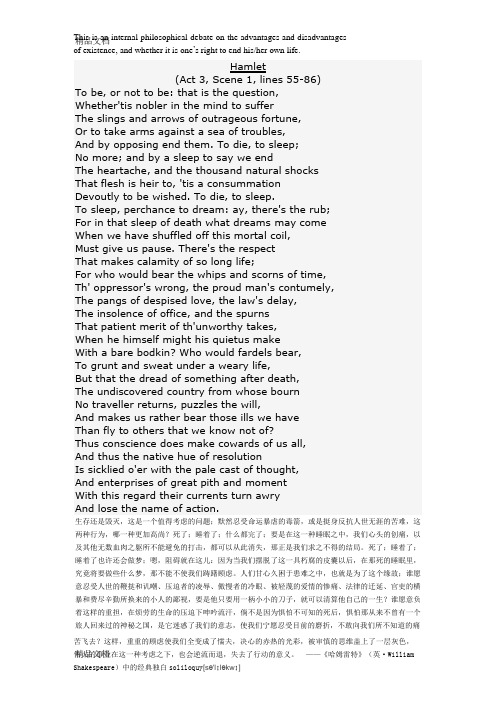
精品文档精品文档 Hamlet(Act 3, Scene 1, lines 55-86)To be, or not to be: that is the question,Whether'tis nobler in the mind to sufferThe slings and arrows of outrageous fortune,Or to take arms against a sea of troubles,And by opposing end them. To die, to sleep;No more; and by a sleep to say we endThe heartache, and the thousand natural shocksThat flesh is heir to, 'tis a consummationDevoutly to be wished. To die, to sleep.To sleep, perchance to dream: ay, there's the rub;For in that sleep of death what dreams may comeWhen we have shuffled off this mortal coil,Must give us pause. There's the respectThat makes calamity of so long life;For who would bear the whips and scorns of time,Th' oppressor's wrong, the proud man's contumely,The pangs of despised love, the law's delay,The insolence of office, and the spurnsThat patient merit of th'unworthy takes,When he himself might his quietus makeWith a bare bodkin? Who would fardels bear,To grunt and sweat under a weary life,But that the dread of something after death,The undiscovered country from whose bournNo traveller returns, puzzles the will,And makes us rather bear those ills we haveThan fly to others that we know not of?Thus conscience does make cowards of us all,And thus the native hue of resolutionIs sicklied o'er with the pale cast of thought,And enterprises of great pith and momentWith this regard their currents turn awryAnd lose the name of action.生存还是毁灭,这是一个值得考虑的问题;默然忍受命运暴虐的毒箭,或是挺身反抗人世无涯的苦难,这两种行为,哪一种更加高尚?死了;睡着了;什么都完了;要是在这一种睡眠之中,我们心头的创痛,以及其他无数血肉之躯所不能避免的打击,都可以从此消失,那正是我们求之不得的结局。
哈姆雷特语录
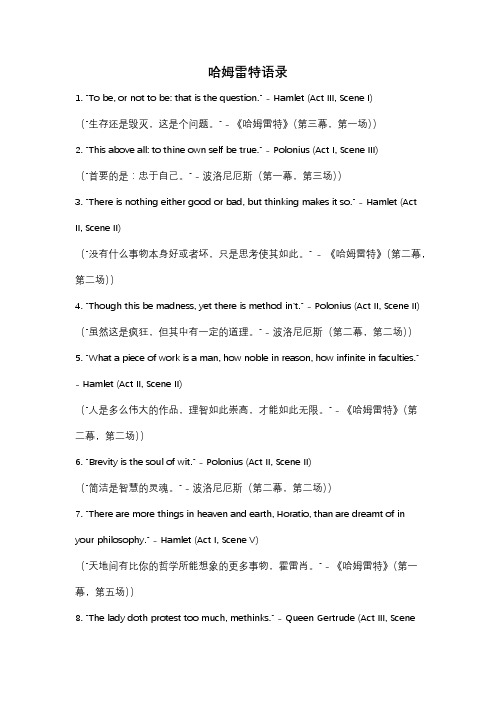
哈姆雷特语录1. "To be, or not to be: that is the question." - Hamlet (Act III, Scene I)("生存还是毁灭,这是个问题。
" - 《哈姆雷特》(第三幕,第一场))2. "This above all: to thine own self be true." - Polonius (Act I, Scene III)("首要的是:忠于自己。
" - 波洛尼厄斯(第一幕,第三场))3. "There is nothing either good or bad, but thinking makes it so." - Hamlet (Act II, Scene II)("没有什么事物本身好或者坏,只是思考使其如此。
" - 《哈姆雷特》(第二幕,第二场))4. "Though this be madness, yet there is method in't." - Polonius (Act II, Scene II) ("虽然这是疯狂,但其中有一定的道理。
" - 波洛尼厄斯(第二幕,第二场))5. "What a piece of work is a man, how noble in reason, how infinite in faculties." - Hamlet (Act II, Scene II)("人是多么伟大的作品,理智如此崇高,才能如此无限。
" - 《哈姆雷特》(第二幕,第二场))6. "Brevity is the soul of wit." - Polonius (Act II, Scene II)("简洁是智慧的灵魂。
哈姆莱特内心独白中英文
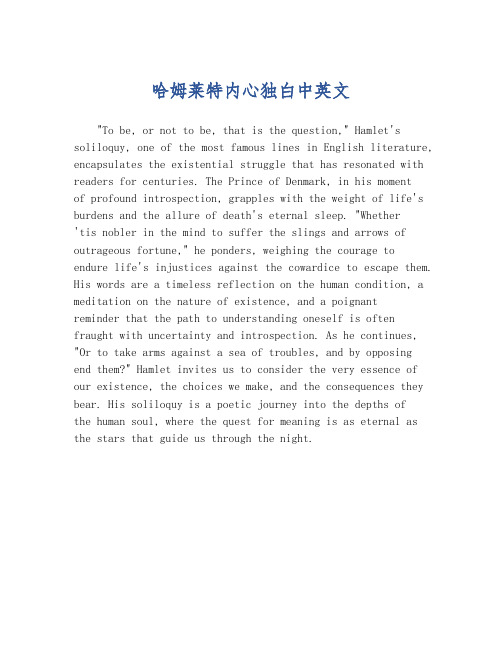
哈姆莱特内心独白中英文"To be, or not to be, that is the question," Hamlet's soliloquy, one of the most famous lines in English literature, encapsulates the existential struggle that has resonated with readers for centuries. The Prince of Denmark, in his momentof profound introspection, grapples with the weight of life's burdens and the allure of death's eternal sleep. "Whether'tis nobler in the mind to suffer the slings and arrows of outrageous fortune," he ponders, weighing the courage to endure life's injustices against the cowardice to escape them. His words are a timeless reflection on the human condition, a meditation on the nature of existence, and a poignantreminder that the path to understanding oneself is often fraught with uncertainty and introspection. As he continues, "Or to take arms against a sea of troubles, and by opposing end them?" Hamlet invites us to consider the very essence of our existence, the choices we make, and the consequences they bear. His soliloquy is a poetic journey into the depths ofthe human soul, where the quest for meaning is as eternal as the stars that guide us through the night.。
哈姆雷特经典台词对白爱情电影英文独白赏析
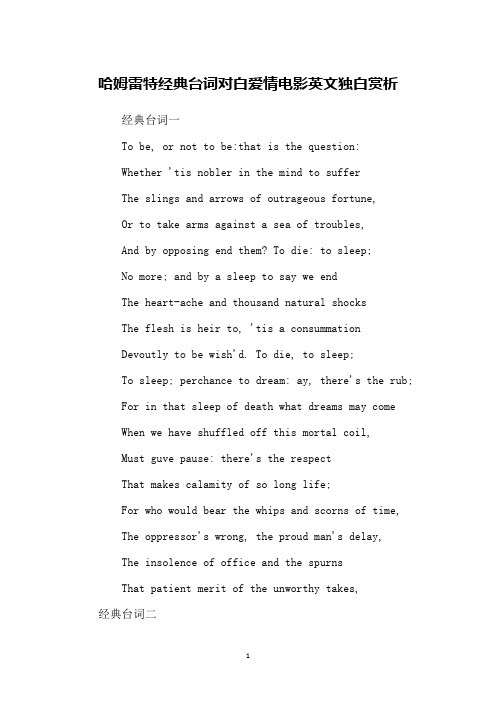
哈姆雷特经典台词对白爱情电影英文独白赏析经典台词一To be, or not to be:that is the question:Whether 'tis nobler in the mind to sufferThe slings and arrows of outrageous fortune,Or to take arms against a sea of troubles,And by opposing end them? To die: to sleep;No more; and by a sleep to say we endThe heart-ache and thousand natural shocksThe flesh is heir to, 'tis a consummationDevoutly to be wish'd. To die, to sleep;To sleep; perchance to dream: ay, there's the rub;For in that sleep of death what dreams may comeWhen we have shuffled off this mortal coil,Must guve pause: there's the respectThat makes calamity of so long life;For who would bear the whips and scorns of time,The oppressor's wrong, the proud man's delay,The insolence of office and the spurnsThat patient merit of the unworthy takes,经典台词二1、在一种悲喜交集的情绪之下,让幸福和忧郁分据了我的双眼,殡葬的挽歌和结婚的笙乐同时并奏,用盛大的喜乐抵销沉重的不幸,我已经和我旧日的长嫂,当今的王后,这一个多事之国的共同统治者,结为夫妇。
Hamlet经典独白to-be--or-not-to-be英汉对照及解析
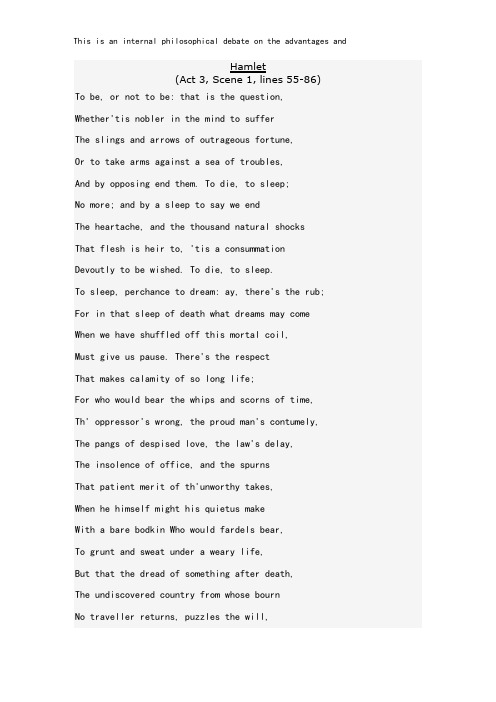
This is an internal philosophical debate on the advantages andHamlet(Act 3, Scene 1, lines 55-86)To be, or not to be: that is the question,Whether'tis nobler in the mind to sufferThe slings and arrows of outrageous fortune,Or to take arms against a sea of troubles,And by opposing end them. To die, to sleep;No more; and by a sleep to say we endThe heartache, and the thousand natural shocksThat flesh is heir to, 'tis a consummationDevoutly to be wished. To die, to sleep.To sleep, perchance to dream: ay, there's the rub;For in that sleep of death what dreams may comeWhen we have shuffled off this mortal coil,Must give us pause. There's the respectThat makes calamity of so long life;For who would bear the whips and scorns of time,Th' oppressor's wrong, the proud man's contumely,The pangs of despised love, the law's delay,The insolence of office, and the spurnsThat patient merit of th'unworthy takes,When he himself might his quietus makeWith a bare bodkin Who would fardels bear,To grunt and sweat under a weary life,But that the dread of something after death,The undiscovered country from whose bournNo traveller returns, puzzles the will,And makes us rather bear those ills we haveThan fly to others that we know not ofThus conscience does make cowards of us all,And thus the native hue of resolutionIs sicklied o'er with the pale cast of thought,And enterprises of great pith and momentWith this regard their currents turn awryAnd lose the name of action.生存还是毁灭,这是一个值得考虑的问题;默然忍受命运暴虐的毒箭,或是挺身反抗人世无涯的苦难,这两种行为,哪一种更加高尚死了;睡着了;什么都完了;要是在这一种睡眠之中,我们心头的创痛,以及其他无数血肉之躯所不能避免的打击,都可以从此消失,那正是我们求之不得的结局。
哈姆雷特经典原文翻译资料讲解
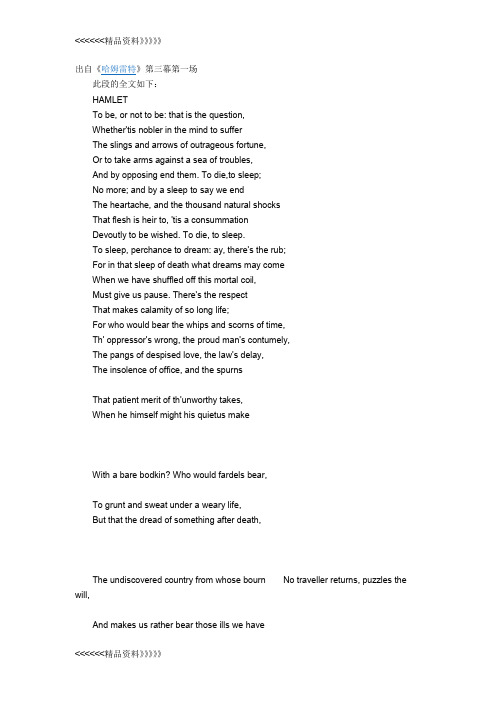
出自《哈姆雷特》第三幕第一场此段的全文如下:HAMLETTo be, or not to be: that is the question,Whether'tis nobler in the mind to sufferThe slings and arrows of outrageous fortune,Or to take arms against a sea of troubles,And by opposing end them. To die,to sleep;No more; and by a sleep to say we endThe heartache, and the thousand natural shocksThat flesh is heir to, 'tis a consummationDevoutly to be wished. To die, to sleep.To sleep, perchance to dream: ay, there's the rub;For in that sleep of death what dreams may comeWhen we have shuffled off this mortal coil,Must give us pause. There's the respectThat makes calamity of so long life;For who would bear the whips and scorns of time,Th' oppressor's wrong, the proud man's contumely,The pangs of despised love, the law's delay,The insolence of office, and the spurnsThat patient merit of th'unworthy takes,When he himself might his quietus makeWith a bare bodkin? Who would fardels bear,To grunt and sweat under a weary life,But that the dread of something after death,The undiscovered country from whose bourn No traveller returns, puzzles the will,And makes us rather bear those ills we haveThan fly to others that we know not of?Thus conscience does make cowards of us all,And thus the native hue of resolutionIs sicklied o'er with the pale cast of thought,And enterprises of great pitch and momentWith this regard their currents turn awryAnd lose the name of action.编辑本段译文生存还是毁灭, 这是个值得考虑的问题: 默然忍受命运暴虐的毒箭, 或是挺身反抗人世无涯的苦难, 通过斗争把他们扫清,这两种行为,哪一种更高贵? 死了,睡着了,什么都完了。
莎士比亚作品汉语译文
莎士比亚作品汉语译文Hamlet:译文在书上 p.215. 下面给出大家上半段的paraphrase:To be or not to be—that is the Question; Whether it’s nobler in the mind to suffer The slings and arrows of outrageous fortune, Or to take arms against a sea of troubles, And by opposing end them?To live or to die, that is a question. Is it better to sustain the bitterness of atrocious fate in the mind, or should people rise up to pick up weapons fighting against and ending so many troubles in one’s life?To die, to sleep—No more; —and by a sleep to say we end The heartache, and the thousand natural shocks That flesh is heir to; ‘Tis a consummation D evoutly to be wishedTo die, to sleep, there will be no more existing. And if we can say that we end the bitterness in our mind and the countless natural strikes that human beings are bound to suffer by a sleep, then a sleep or a death would be the perfect thing that we have seriously wished for.To die, to sleep; To sleep, perchance to dream. Ay, there’s the rub; For in that sleep of death what dreams may come, When we have shuffled off this mortal coil, Must give us pause. There is the respect That makes calamity of so long life;To sleep perhaps is to dream, that is where the trouble is. In the sleep of death, when we get rid of our physical bodies and free ourselves from these earthly troubles, what may come as our dreams must make us hesitate. It is with this very consideration that people would rather endure a life so long and so painful.Macbeth何时姊妹再相逢,雷电轰轰雨蒙蒙?女巫乙且等烽烟静四陲,败军高奏凯歌回。
莎士比亚感叹命运无常的英语名句
莎士比亚感叹命运无常的英语名句
"To be or not to be, that is the question." - 这句来自《哈姆雷特》,表达了人生中无法避免的困境和命运的不可预测。
"What's done is done. The die is cast." - 这句话来自《麦克白》,展现了命运的无常和人生选择的不可逆。
"All the world's a stage, and all the men and women merely players." - 这句话来自《皆大欢喜》,描绘了人生如戏,命运如舞台,人们只是其中的演员。
"The wheel has come full circle." - 这句话来自《罗密欧与朱丽叶》,表达了命运的轮回和人生经历的重复。
"Fortune is like glass; it glitters then it shatters." - 这句话来自《威尼斯商人》,形容了命运的短暂和无常。
这些名句都体现了莎士比亚对命运的深刻理解和对人生的深入思考,同时也展现了其作品中的悲剧色彩和人文关怀。
通过这些句子,我们可以更好地理解莎士比亚的作品,以及其所表达的人生命运的无常和不可预测。
《哈姆雷特》第三幕第一场精彩对白,to be or not to be教程文件
《哈姆雷特》第三幕第一场精彩对白,t o b e o r n o t t o b e此段的全文如下:To be, or not to be- that is the question: whether it's nobler in the mind to suffer the slings and arrows of outrageous fortune, or to take arms against a sea of troubles, and by opposing end them? To die:to sleep;no more; andby a sleep to say we end the heartache and the thousand natural shocks that flesh is heir to. 'tis a consummation devoutly to be wish'd. To die:to sleep; To sleep: perchance to dream: ay, there's the rub: for in that sleep of death what dreams may come when we haveshuffled off this mortal coil, must give us pause: there's the respect that makes calamity of so long life;For who would bear the whips and scorns of time, the oppressor's wrong, the proud man's contumely, the pangs of despis'd love, the law's delay,the insolence of office, and the spurns that patient merit ofthe unworthy takes, when he himself might his quietus make with a bare bodkin? Who would fardels bear, to grunt and sweat under a weary life, but that the dread of something after death, the undiscover'd country, from whose bourn no traveller returns, puzzles the will and makes us rather bear those ills we have than fly to others that we know not of? Thus conscience does make cowards of us all; And thus the native hue of resolution is sicklied o'er with the pale cast of thought, and enterprises of great pith and moment with this regard their currents turn awry, and lose the name of action.生存还是毁灭, 这是个值得考虑的问题: 默然忍受命运暴虐的毒箭, 或是挺身反抗人世无涯的苦难, 通过斗争把他们扫清,这两种行为,哪一种更高贵? 死了,睡着了,什么都完了。
《哈姆雷特》经典台词to be or not to be ,that is a question
《哈姆雷特》 to be or not to be ,that is a question To be,or not to be:that is the question: Whether'tis nobler in the mind to sufferThe slings and arrows of outrageous fortune,Or to take arms against a sea of troubles,And by opposing end them.To die:to sleep;No more;and by a sleep to say we endThe heart-ache,and the thousand natural shocks That flesh is heir to,'tis a consummation Devoutly to be wish'd.To die,to sleep;Tosleep:perchancetodream:aye,there's therub;For in that sleep of death what dreams may come, When we have shuffled off this mortal coil,Must give us pause:there's the respectThat makes calamity of so long life;For who would bear the whips and scorns of time, Theoppressor's wrong,theproud man's contumely,The pangs of despised love,the law's delay,The insolence of office,and the spurnsThat patient merit of the unworthy takes,When he himself might his quietus makeWith a bare bodkin?who would fardels bear,To grunt and sweat under a weary life,But that the dread of something after death, The undiscover'd country from whose bourn No traveler returns,puzzles the will,And makes us rather bear those ills we have Than fly to others that we know not of? Thus conscience does make cowards of us all, And thus the native hue of resolutionIs sicklied o'er with the pale cast of thought, And enterprises of great pitch and moment With this regard their currents turn awry And lose the name of action.翻译为生存或毁灭,这是个必答之问题:是否应默默的忍受坎苛命运之无情打击,还是应与深如大海之无涯苦难奋然为敌,并将其克服。
- 1、下载文档前请自行甄别文档内容的完整性,平台不提供额外的编辑、内容补充、找答案等附加服务。
- 2、"仅部分预览"的文档,不可在线预览部分如存在完整性等问题,可反馈申请退款(可完整预览的文档不适用该条件!)。
- 3、如文档侵犯您的权益,请联系客服反馈,我们会尽快为您处理(人工客服工作时间:9:00-18:30)。
This is an internal philosophical debate on the advantages and disadvantages
of existence, and whether it is one’s right to end his/her own life.
Hamlet
(Act 3, Scene 1, lines 55-86)
To be, or not to be: that is the question,
Whether'tis nobler in the mind to suffer
The slings and arrows of outrageous fortune,
Or to take arms against a sea of troubles,
And by opposing end them. To die, to sleep;
No more; and by a sleep to say we end
The heartache, and the thousand natural shocks
That flesh is heir to, 'tis a consummation
Devoutly to be wished. To die, to sleep.
To sleep, perchance to dream: ay, there's the rub;
For in that sleep of death what dreams may come
When we have shuffled off this mortal coil,
Must give us pause. There's the respect
That makes calamity of so long life;
For who would bear the whips and scorns of time,
Th' oppressor's wrong, the proud man's contumely,
The pangs of despised love, the law's delay,
The insolence of office, and the spurns
That patient merit of th'unworthy takes,
When he himself might his quietus make
With a bare bodkin? Who would fardels bear,
To grunt and sweat under a weary life,
But that the dread of something after death,
The undiscovered country from whose bourn
No traveller returns, puzzles the will,
And makes us rather bear those ills we have
Than fly to others that we know not of?
Thus conscience does make cowards of us all,
And thus the native hue of resolution
Is sicklied o'er with the pale cast of thought,
And enterprises of great pith and moment
With this regard their currents turn awry
And lose the name of action.
生存还是毁灭,这是一个值得考虑的问题;默然忍受命运暴虐的毒箭,或是挺身反抗人世无涯的苦难,这两种行为,哪一种更加高尚?死了;睡着了;什么都完了;要是在这一种睡眠之中,我们心头的创痛,以及其他无数血肉之躯所不能避免的打击,都可以从此消失,那正是我们求之不得的结局。
死了;睡着了;睡着了也许还会做梦;嗯,阻碍就在这儿:因为当我们摆脱了这一具朽腐的皮囊以后,在那死的睡眠里,究竟将要做些什么梦,那不能不使我们踌躇顾虑。
人们甘心久困于患难之中,也就是为了这个缘故;谁愿意忍受人世的鞭挞和讥嘲、压迫者的凌辱、傲慢者的冷眼、被轻蔑的爱情的惨痛、法律的迁延、官吏的横暴和费尽辛勤所换来的小人的鄙视,要是他只要用一柄小小的刀子,就可以清算他自己的一生?谁愿意负着这样的重担,在烦劳的生命的压迫下呻吟流汗,倘不是因为惧怕不可知的死后,惧怕那从来不曾有一个旅人回来过的神秘之国,是它迷惑了我们的意志,使我们宁愿忍受目前的磨折,不敢向我们所不知道的痛苦飞去?这样,重重的顾虑使我们全变成了懦夫,决心的赤热的光彩,被审慎的思维盖上了一层灰色,伟大的事业在这一种考虑之下,也会逆流而退,失去了行动的意义。
——《哈姆雷特》(英·William Shakespeare)中的经典独白soliloquy[sə'lɪləkwɪ]。
